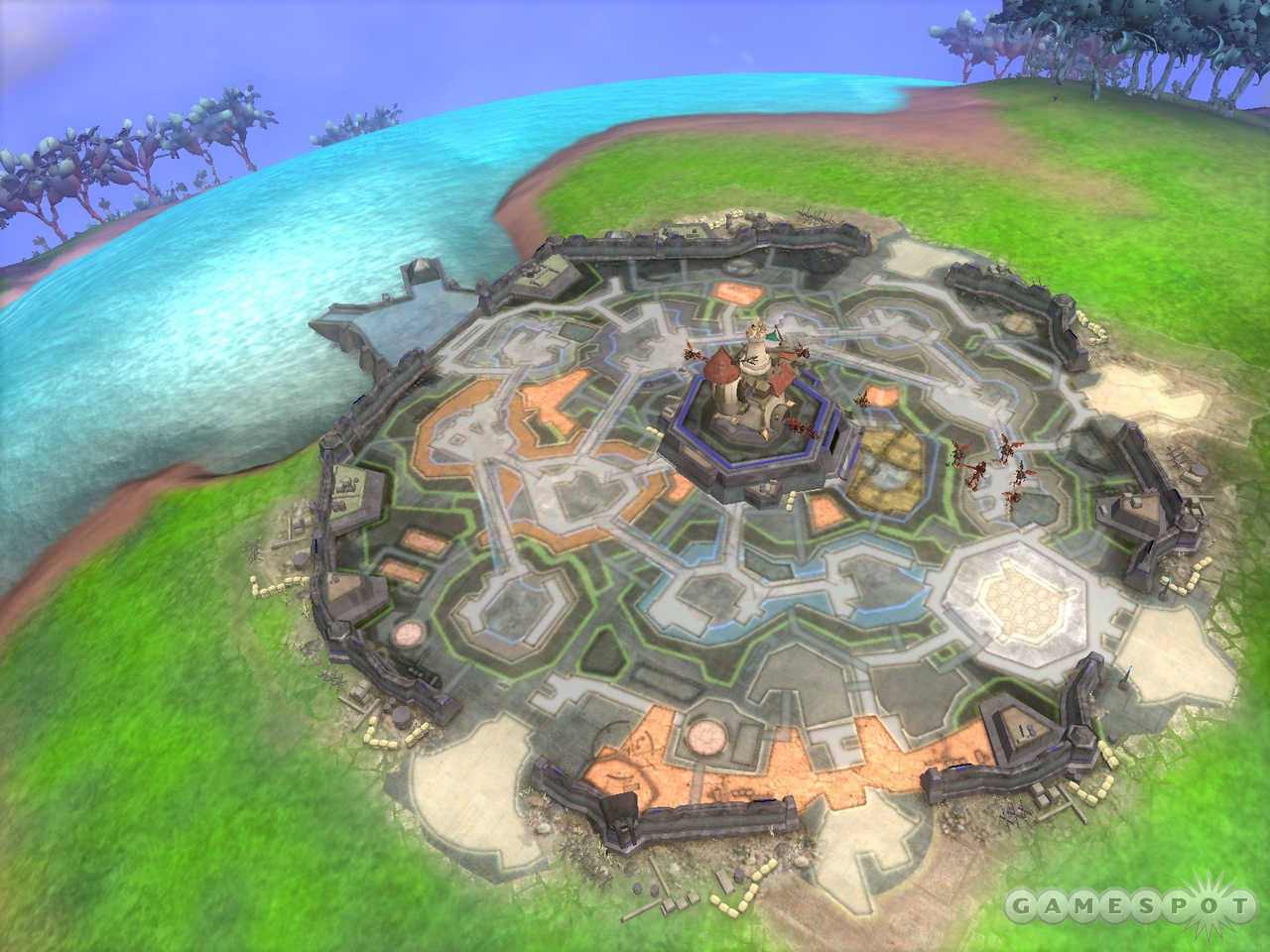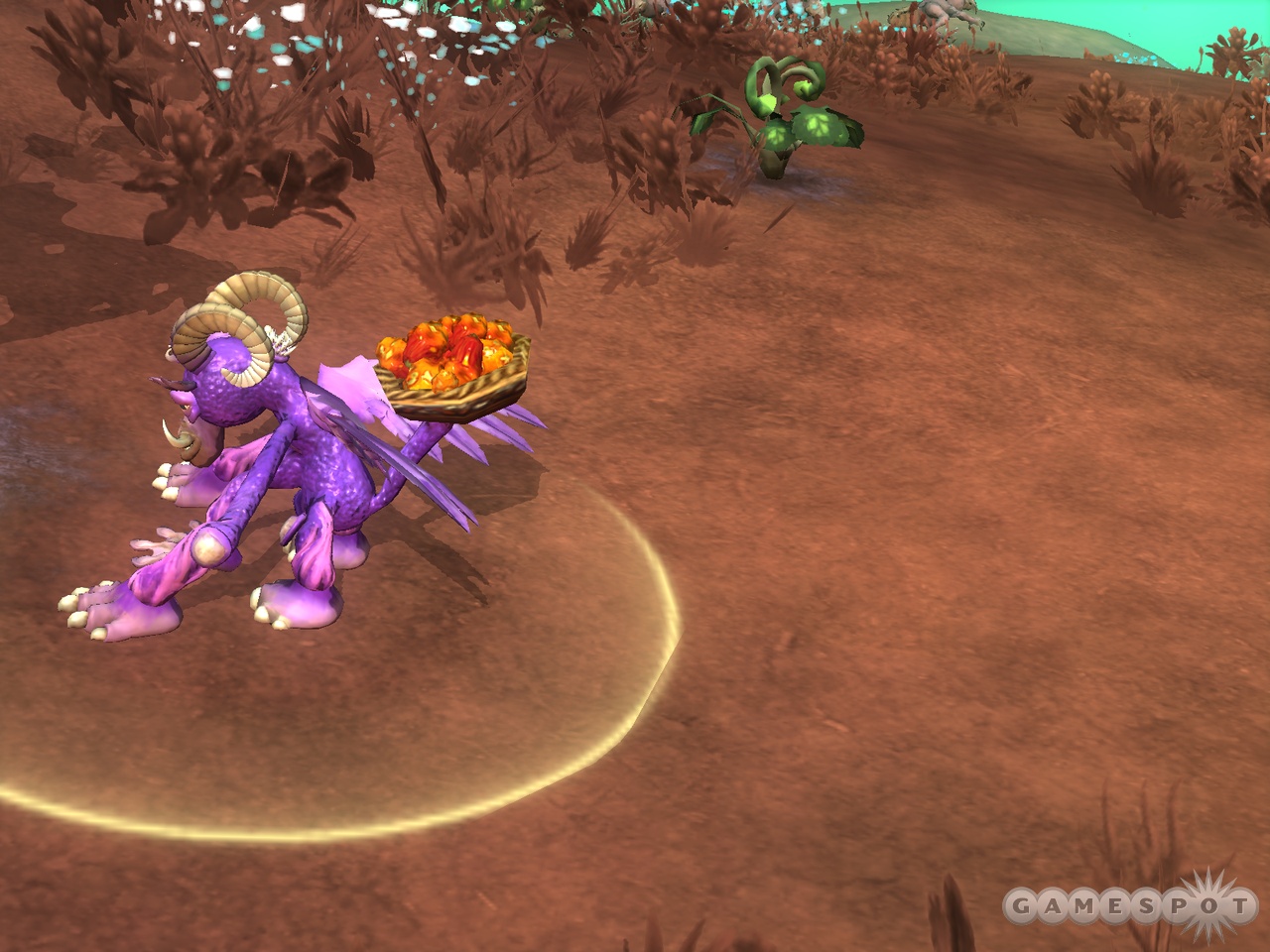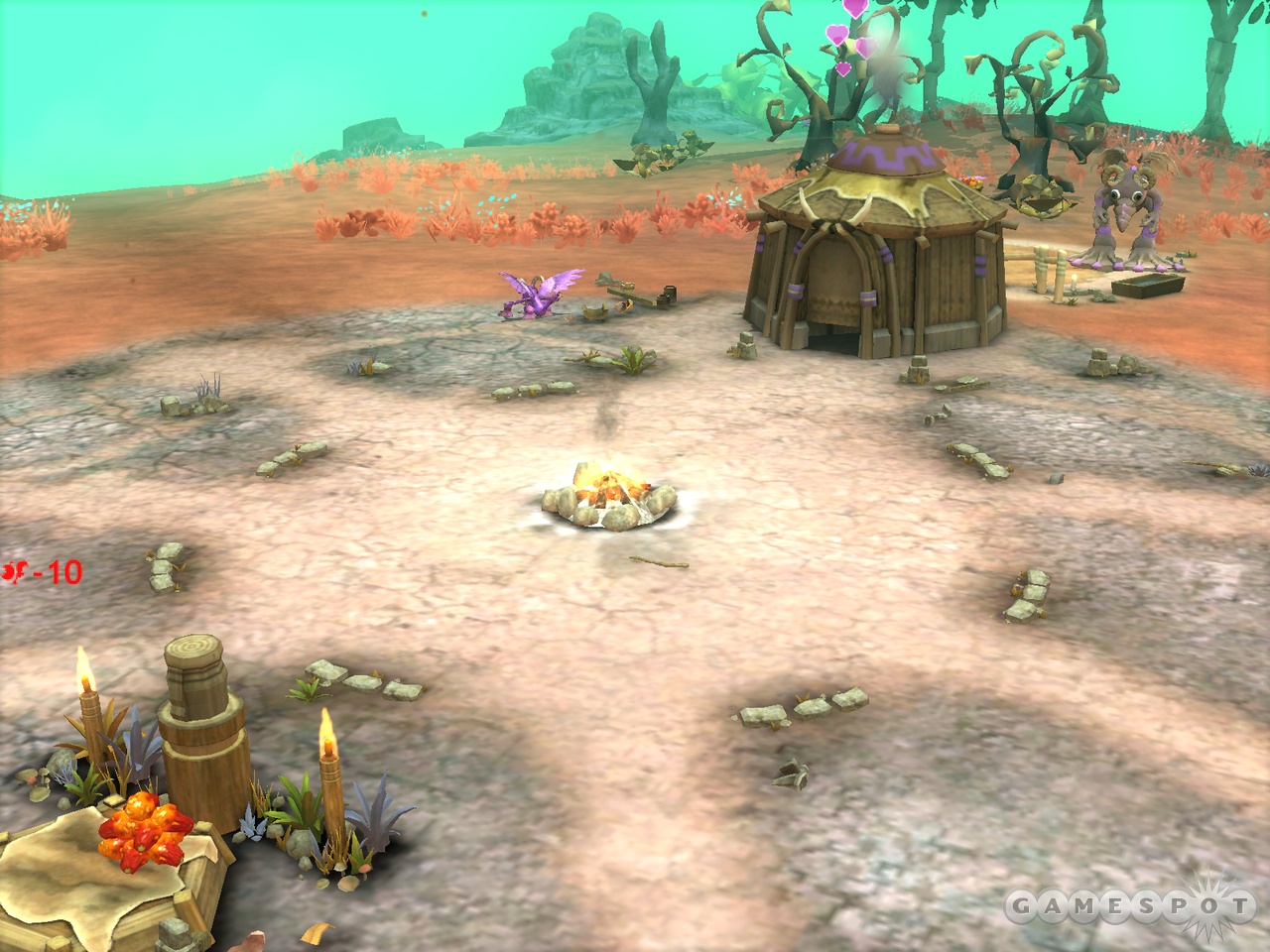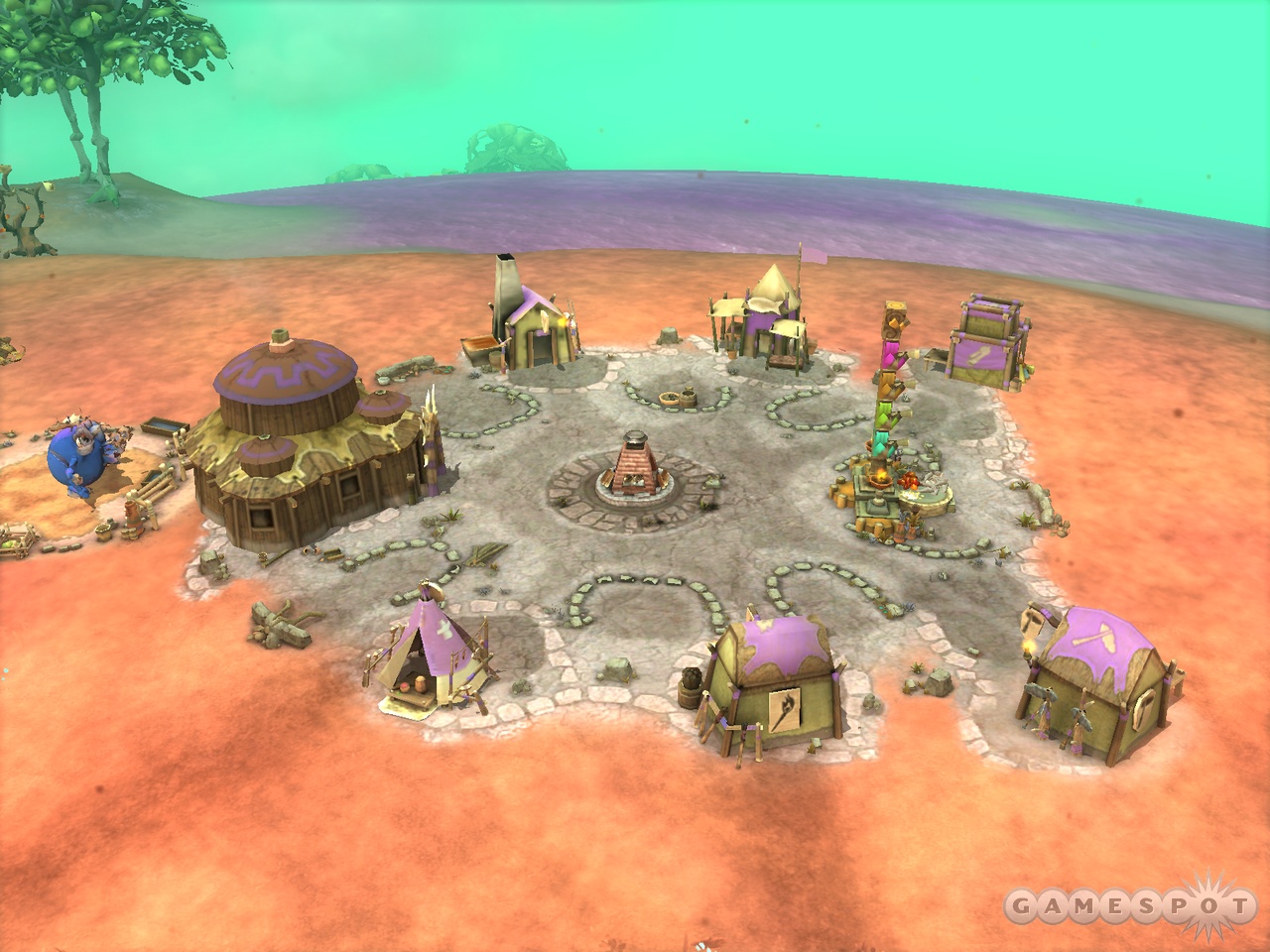Spore Exclusive Hands-On - From Cell to Civilization
Did you ever think plant-eating cells would evolve into religious zealots? We find out in our exclusive time with Spore.
Evolution is a long, slow process, and its effects sometimes aren't noticeable for millions of years. In Spore, it takes about 15 minutes. We visited EA Maxis this week as part of our ongoing coverage leading up to the game's September 7 release date, and we played through the cell stage up to the final moments of the tribal stage as our creature evolved from single-celled organism to fire-wielding biped. Someday we'll conquer the planet and then the galaxy in the civilization and space stages, but today, we'll walk you through the first half of Maxis' hybrid strategy game.
Your first decision is one of the most important and will affect everything down to the design of your spaceship a billion game years in the future: Do you eat meat? Carnivores are more aggressive than their vegetarian cousins in Spore, and the simple act of eating animal cells instead of plant cells will lead species to be more hostile. That said, evolution in Spore is at your fingertips, and one mating call will take you to the cell creator tool, letting you completely reverse the direction of your evolution should your gameplay tastes change.

Once you decide on your diet, you choose one of several planets to play on. You have the option to begin from any of the five phases, should you want to skip the rather simple cell stage which, in some ways, plays more like a casual downloadable game. Indeed, after a meteor crashes into the ocean, seeding it with life (that's you), your first and only goal is to survive, swimming about using keyboard controls or the mouse, chomping on floating pieces of red meat, or green plants if you chose to play vegan (we didn't). With each piece of food you eat, you gain a point on the progress bar and grow slightly in size.
You're not alone in the primordial soup, however. Other cell creatures are fighting for food as well, and some are a lot bigger than you. To succeed, you have to avoid larger creatures that see you as nothing more than an afternoon snack and go after smaller creatures, many of which are user creations straight out of the Sporepedia. When you take out a competing organism, they will often drop new body parts that are added to the creator tool.
Then, by clicking on the mating call button, you swim up to a friendly cell of the same species--which are now everywhere as you begin to assert your dominance of the primordial soup--and make a baby cell. You can outfit this next generation with any of the body parts you've collected. Our new cell transformed from a friendly little guy with a pair of spikes to a poison-spitting, electrocuting ball of doom in just one generation. With significant DNA points and such evolutionary advantages, our cell was now ready to advance to the creature stage.
This stage takes you to an abridged version of the Spore creature creator, already available for $10 for dedicated mad scientists hoping to create the master race. Only this time you have just one evolutionary category to choose from: legs. Attach them to your cell and then crawl forth to land as a smaller fish in a bigger pond, a theme common in each Spore stage. Our creature was outfitted with a poison stinger, two electrical nodes, a few spikes, a pair of eyes, and carnivorous, flesh-ripping beak. After we advanced to the creature stage, a handy timeline popped up displaying each of our new generations and their evolutionary advancements over hundreds of millions of years.
Each stage will introduce an increasing number of strategy elements; the creature stage begins with a land map and home nest. The nest is where you can regain health if injured and recruit clan members of your own species to join you on a hunting party, the humble beginnings of civilization. As a carnivore, the only way to advance is to eat other creatures.

Thankfully some of the creatures are much less evolved than you, equipped with only legs and mouths and as easy to eat as an apple on the ground. Most species that you encounter, however, are more advanced than your own, and in these cases it's not advisable to go in chomping. Instead, change your "stance" from aggressive to friendly, and you'll open a new batch of diplomacy actions such as sing and dance. Some species are inherently aggressive and will attempt to eat you, forcing you back to the nest to wait for a hundred million years of evolution and growth before you're strong enough to take them on. Others enjoy a good song and dance and will be impressed by your creatures' performances. This little minigame is the base of all diplomacy for future generations.
Speaking of future generations, body parts litter the environment in the creature stage and are added to the creature creator pool for use after each mating call. When an egg hatches with your new modifications, the entire species will have been edited. Also, the baby's parents will teach you new moves such as strike attacks before letting you out of the nest to hunt. Continue to impress neighboring species or eat others into extinction to fill up your progress bar. This opens up more slots for clan members, but as you progress to the tribal stage, the need to be more organized becomes clear.

Soon, the alpha member of your species discovers fire. He grabs a stick and pumps it into the air in triumph, attracting other members of the species. They are impressed by his bravado and decide to follow his leadership as chieftain. Welcome to the tribal stage.
At this point the evolution of your creature is complete. Now you begin to learn the use of rudimentary tools and to craft ornate clothing. Members of the tribe gather around a makeshift village that consists of a hut and a fire. This is also where you gain the ability to command tribe members, selecting them much the same way you would select a unit in a real-time strategy game. As primitive hunters and gatherers, your first goal is to find food. Simply point and click on one of your tribe members and order him toward a food source such as wild animals or fruit trees. He will automatically collect the food and bring it home to your stockpile.
Food in the tribal stage acts as currency, used as gifts to wild animals in order to domesticate them, offered to rival tribes as a peace offering, or used to make new babies as you grow your tribe. It can also be used to purchase new huts for the village, unlocking new tools. Fishing spears, throwing spears, battle-axes, flaming torches, and musical instruments all become available, but there isn't room for everything. Hunting and gathering tools are useful for everyone, and fishermen armed with spears are much more productive than those using their bare hands--or whatever appendage you designed back in the creature creator. But more aggressive tribes may want to fashion weapons for midnight raids, while friendly folk might instead craft musical instruments.
There are five rival tribes in this stage, and you progress by either recruiting them to your cause or killing them off. Aggressive tribes will want to offer rival chiefs a gift of food, after which the tribes will become "ambivalent" to your presence, buying you time to build up resources and transform your tribe into an axe-wielding army. Then, when the time is right, gather a massive party, kill the rival chief, destroy their main hut, steal their technology, and eliminate the tribe. To commemorate your victory, add a totem piece to your camp.
Of course, Spore is simply one of the cutest games to appear this year, so many players will want to avoid violence and make friends with other tribes. To do so, you equip your tribe members with musical instruments such as maracas and didgeridoos. Then, make your way to the rival tribe village and talk with the chief. Be sure to switch your posture from aggressive to friendly so the tribe doesn't mistake your caveman orchestra for a hunting party.

When you talk to the chief, a musical minigame will unfold, and the other tribe will ask you to play one of three musical instruments. Simply answer them by pressing 1, 2, or 3 on the number keys, and the tribe will love your performance, offering to become your allies. New allies, like conquered foes, mean one more piece of totem for your pole.
Even after you've conquered the land with music, axes, or both, your tribe will need further organization. It's time to get civilized! We'll be back with an in-depth preview of the civilization and space stages soon. In the meantime, be sure to check out direct feed of Spore in action.
Got a news tip or want to contact us directly? Email news@gamespot.com
Join the conversation